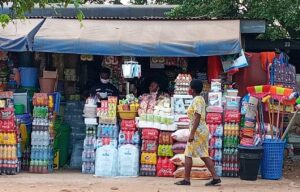Graduate unemployment in Ghana would soon become a thing of the past if students adopt an entrepreneurial mindset and problem-solving skills while on campus.
These sentiments were shared by a number of students of the University of Ghana when the newly launched newspaper, the DCS Weekly, interacted with students on the main campus earlier this week.
Graduate unemployment in Ghana has remained a perennial issue, and the focus of several policy initiatives of the government. The National Labour Commission estimates about 700,000 tertiary school graduates are unemployed.
Speaking on the subject of students’ financial management, most of the students interviewed disclosed that they had started various entrepreneurial ventures to raise extra income for their upkeep on campus.
“I began shopping and cooking for my colleagues who did not know how to cook, especially the guys,” said a final-year B.A. Arts female student, Ethel Ashong-Nuga. She explained that retailing essential groceries to colleague students provided her with alternative sources of income. Ashong-Nuga, who is also a dance expert, disclosed that she also teaches choreography to make ends meet.
It is not only females who are entrepreneurial on campus. Interactions with students revealed the fact that males also undertake common business activities. They retail food items, clothes and shoes, as well as engage in sewing and fashion designing. However, while the provision of beauty-related services such as facial and hair care were limited to the female students, the males were more involved into ventures such as sale of hardware, and sports-betting.
A second-year student of Legon Hall, Dennis Coleman, had this to say: “There is this guy on my floor who brings in a full basket of ‘A-1’ bread every morning, and all the guys on the floor buy from him”.

“Another guy on my floor repairs laptops, phones and smart devices, and the students patronise his services at a fee,” Coleman added.
Throwing light on how the students were able to combine their academic work with these business activities, another final-year student, Joshua Awuitor, admitted that their academic timetable had been structured in a manner that made lecture schedules flexible. “Some students attend lectures two or three days in a week; so, there is ample time to pursue alternative income-generating ventures without compromising their studies,” he added.
Studies have recommended fashioning coordinated strategies to address this problem. Key among these is the promotion and support of youth entrepreneurial and job creation programmes as alternative avenues to absorb these graduates. This calls for a concerted effort by key actors such as the government, the universities and other tertiary institutions, as well as the private sector.
More findings came up during this interactive visit which formed part of the activities of the DCS Weekly’s launch. Key among these was the fact that the students required some financial literacy skill support because according to a female Social Science student who calls herself Ms. B, “We spend quite a lot on our hair, makeup and other trendy stuff, yet we fail to save. Today’s students on campus need help,” she admitted.
The DCS Weekly, is the mouth-piece of the 2021/2022 cohort of Print Journalism students of the Department of Communication Studies in the University of Ghana. It would provide the platform for the grooming and honing of the writing skills of these prospective journalists for the professional world and industry.










